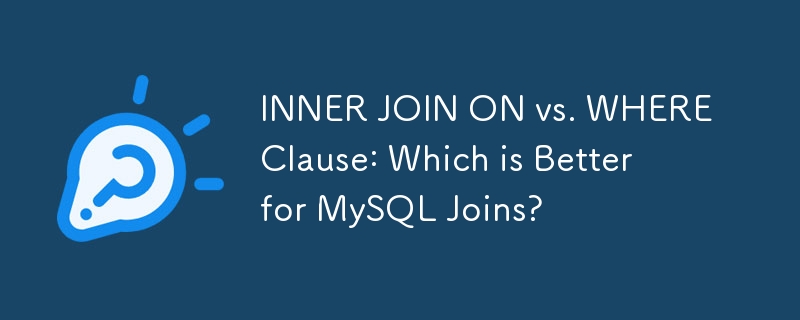Home >Database >Mysql Tutorial >INNER JOIN ON vs. WHERE Clause: Which is Better for MySQL Joins?
INNER JOIN ON vs. WHERE Clause: Which is Better for MySQL Joins?
- Barbara StreisandOriginal
- 2025-01-25 07:17:09757browse

MySQL JOIN: In-depth discussion of INNER JOIN ON and WHERE clauses
When joining tables in MySQL, you can use the WHERE clause or INNER JOIN ON syntax. While the two approaches may seem interchangeable, they have subtle differences in readability, scalability, and performance.
Readability and Grammar
INNER JOIN is a more standardized syntax recommended by ANSI. It clearly defines the join conditions between tables, making queries easier to understand, especially in complex joins involving multiple tables.
Scalability and interchangeability
The WHERE clause syntax is more rooted in the relational model, where a filter is applied to select rows based on matching join columns. This syntax is more suitable for expressing complex or nonstandard join conditions that cannot be easily expressed using INNER JOIN. However, in complex queries it can be less readable and error-prone.
Performance
In MySQL, the performance of these two methods is generally considered equivalent for simple joins with a single join condition. However, in some cases, the STRAIGHT_JOIN clause can provide performance benefits by controlling the order of joins. This option is not available in WHERE clause syntax.
Conclusion
Ultimately, the choice between INNER JOIN ON and WHERE clauses depends on the specific requirements of your query. To improve readability, scalability, and ease of use, it is generally recommended to use INNER JOIN ON. However, if you need to express complex join conditions or optimize performance using STRAIGHT_JOIN, the WHERE clause syntax may be more appropriate.
The above is the detailed content of INNER JOIN ON vs. WHERE Clause: Which is Better for MySQL Joins?. For more information, please follow other related articles on the PHP Chinese website!

